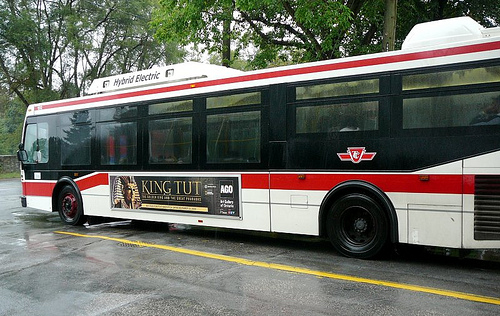This morning I had the commute from hell, along with many other T.T.C. passengers. My bus ride to the subway station, which usually takes twenty minutes on a bad day, took an hour and a half. I got to work 45 minutes late, and from the sounds of your constant loud complaining that everyone on the bus had to listen to for an hour, you were late too.
Yes, I know it is frustrating. Yes, I know that the T.T.C. has its share of problems, like aging signal equipment and less than ideal public announcement systems. But it seems unfair to blame the bus driver for a traffic accident that happened while he was way over on the other end of the city picking you up so he could listen to your insults. We were ALL uncomfortable. We were ALL late, and we were ALL frustrated. But you know, sometimes crap just happens and we have to live with it.
The bus driver was just doing his job, and he was doing it well. He remained cheerful and polite despite the fact that you referred to him as an asshole who was making you late. He was trying to keep all of us informed as to what was going on, but he cannot pass on information that he doesn’t have. Give the poor guy a break. Imagine how frustrated he must have felt, knowing that he would be letting us off at the subway station and then driving back through the traffic mess.
I had the misfortune to end up in the same section of the subway train as you. This time I had to listen to you bitch and moan about the fact that the train was so crowded. Just further evidence, in your eyes, of the abhorrent state of the T.T.C. You got a decent seat, so what were you complaining about? Other people had to stand, having just stood for well over an hour in the bus. I didn’t hear them throwing their toys out of the cot.
While we’re on the subject of your seat, I feel obligated to point out that the elderly gentleman you gave dirty looks to had more right than your bag to sit in the seat beside you. Other people put their bags on the floor in front of them. What’s wrong with you doing the same? It’s not like your bag is better than anyone else’s.
Thank God you got off the train two stops before I did. Dealing with you while I was transferring from one crowded subway line to the other might have been a bit much.
I found you, fellow T.T.C. passenger, to be rude, insulting, and selfish. But because I am a forgiving type who gives people the benefit of the doubt (or maybe I’m just a pushover), I am open to the possibility that you are generally a nice person who is going through a really bad time.
And I wish you a lovely day.
Yours faithfully,
The woman you pushed past so roughly that she spilled coffee all over her coat
(Photo credit: http://www.flickr.com/photos/stevenharris/3986106972)










